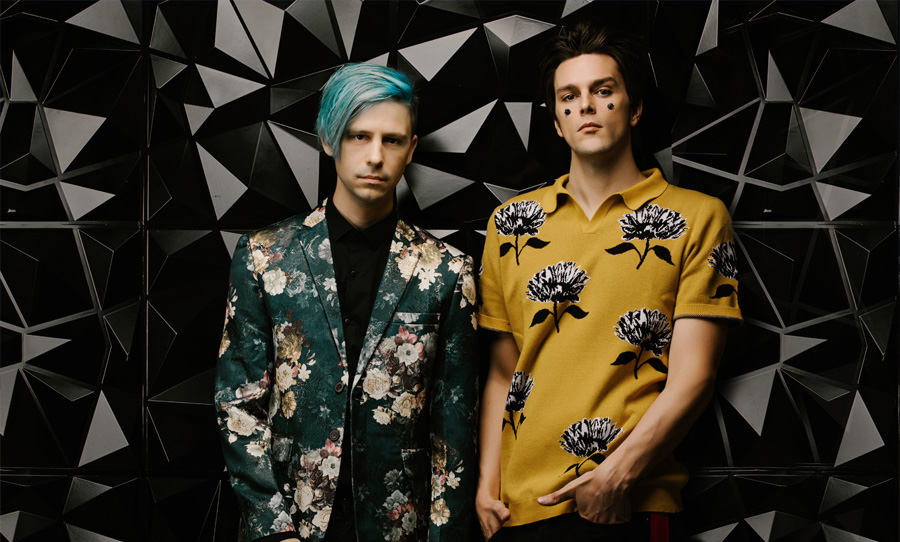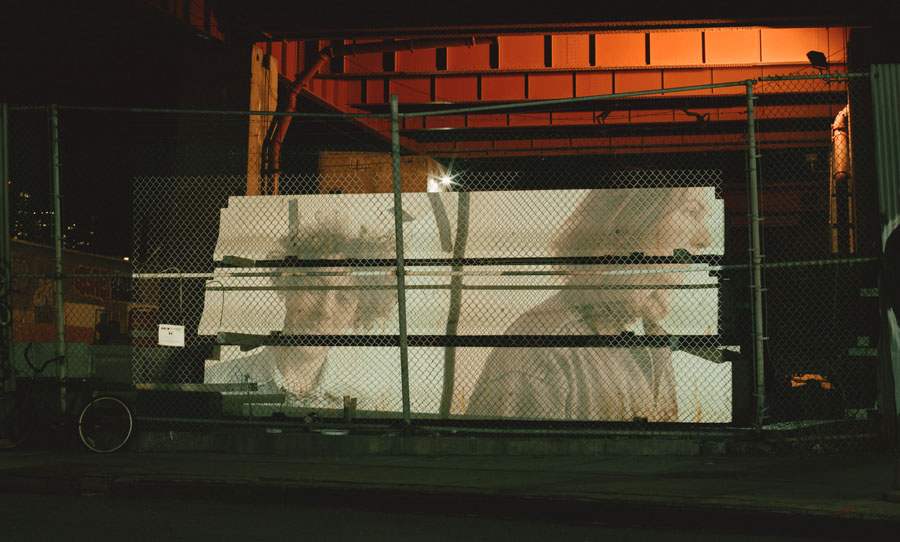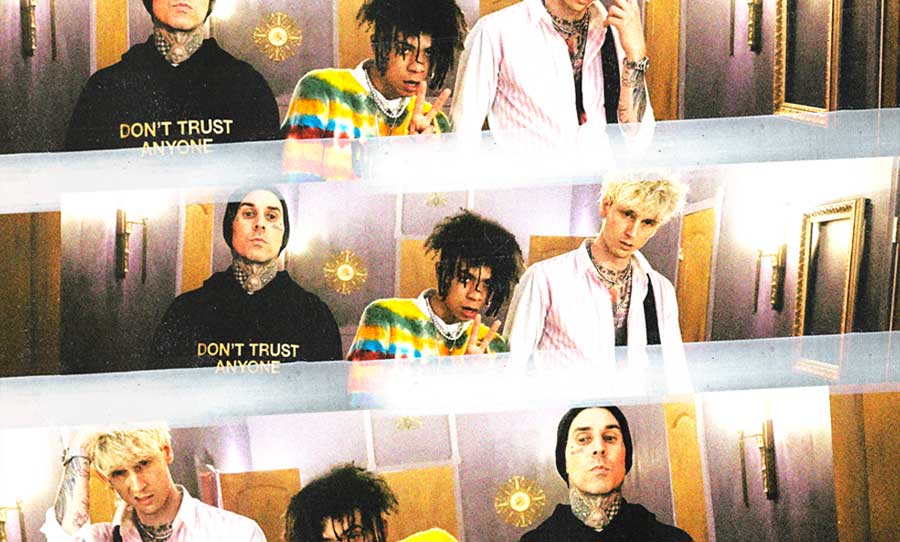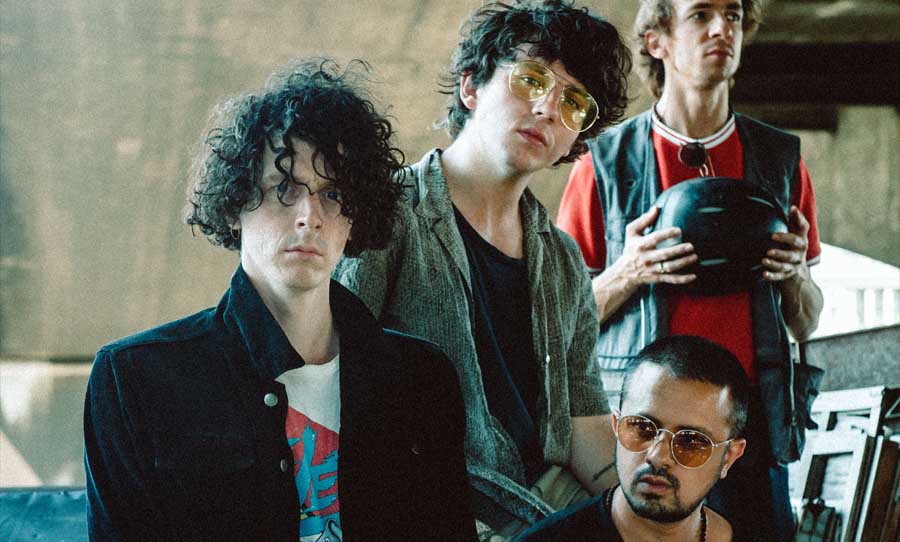Every now and again you come across a band and mumble to yourself, “shit, I wish I had thought of that“. Such is the case for I Don’t Know How But They Found Me.
A splinter group of various LA ensembles, IDKHow boast a concept any throwback band would be jealous of. Their music, videos, every point of their output – if their sources are to be believed – are pieces of information from the late ’70s and early ’80s, recently unearthed by an unknown benefactor.
It’s a fantastic play on nostalgia, a trump card on our addiction to the past, and it’s working a treat. As this mysterious band from the past drop their (27 year old) 1981 Extended Play EP, we caught up with frontman Dallon Weekes for a chat.
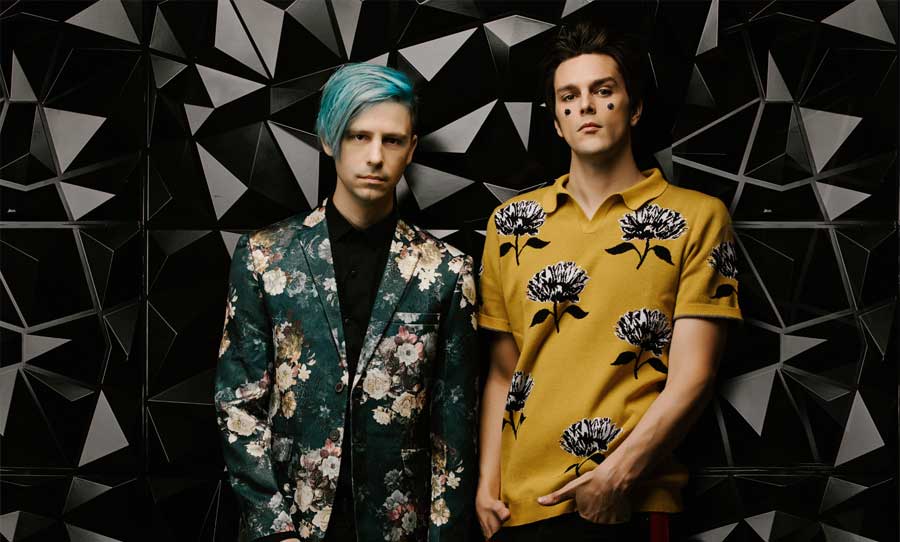
Recreating the past is something artists have been doing for decades, but few have accomplished it with the mastery of I Don’t Know How But They Found Me.
DALLON: Hey, how are you going?
HAPPY: Yeah great, you?
DALLON: Not too bad, just trying to pack up some bags and get ready for a tour. I’m still at home but I’m heading out tomorrow. I’m not exactly sure where the tour starts, I’ve had a pretty crazy week. I got back from New York last night and the Bohemian Rhapsody premiere.
HAPPY: Oh, sweet.
DALLON: My wife took me along with her, it was really cool.
HAPPY: How was the movie?
DALLON: It was great! Definitely made me cry more than once. I’m a sucker for rock biopics, for sure, but that’s definitely the best one I’ve ever seen.
HAPPY: Well I’ll have to check it out.
DALLON: For sure.
HAPPY: So the idea of I Don’t Know How, unearthing old footage, I really like it because I think everyone understands that there is something special about watching something from another era. That ‘I wonder where these people are now’ feeling. Was that what drew you to the concept?
DALLON: Yeah, a lot of my favourite artists that I love, I discovered that way. Bands and artists that I didn’t know existed until I stumbled across some old Top of the Pops performance or something. You know like Sparks or Joe Jackson, things like that. T. Rex. Bands like that I loved discovering in that way, and I kind of wanted to recreate it. So that was the genesis behind how IDK started.
HAPPY: I know how that feels. I’ve done the whole Old Grey Whistle Test and Soul Train binges. Watching them is amazing.
DALLON: Yeah, all of that stuff. I’ll still sit on Youtube and watch that stuff for hours, it’s so great.
HAPPY: Do you think people are more drawn to that stuff now than ever? It’s more available, it’s a huge time for throwback music, reissues are massive, the VHS aesthetic is super popular…
DALLON: Well I think it’s a pretty special thing that lives in the memories of people who grew up with it. It’s all there… ‘nostalgic’ is the wrong word I think, a lot of that VHS revivalist stuff you’re talking about, people do it with a wink and a nod, like “remember this?”. That’s great, but that’s not really want I wanted to do when I started with this a year ago. I more wanted to recreate the feeling of seeing a band you’d never heard of before on TV for the first time. To learn about this new thing and just be like, enthralled by it and you have to know everything about it after that. And you couldn’t, because there was no internet. So you’d go to, you know, a news stand and buy a magazine and try to find out more about this thing.
HAPPY: Yeah.
DALLON: I think when you discover things on your own it’s different. I was trying to recreate that feeling, more than any sort of ‘80s revivalist stuff – which I think is fine. But it’s not really what we’re shaping.
HAPPY: Right. So I haven’t seen any footage from your live shows, but do you try to bring that aesthetic to the stage as well?
DALLON: Yeah definitely. We never try to do the same show twice. You know, even though we’re just a two piece band with a track, there are moments when we turn the tracks off and sort of just improv. We never want to repeat ourselves.
HAPPY: I’m all for the backing track. Some people do it to keep the band small, some do it to show a bit more character on stage, what made you choose to perform like that?
DALLON: Um, convenience! At the time when we started to do this, Ryan and I were both in other bands. And we wanted to do shows secretly and in a way that was cheap and easy to do, and the way to do that was using a backing track. Luckily people don’t really care about that thing anymore, maybe about ten years ago even I would have scoffed, but now we don’t really care anymore. It’s just another tool.
HAPPY: There’s this guy Emerson Snowe in Australia who performs to a backing track, but it’s to a tape. It’s kind of cool, but it can also fuck up, so he’s just there on stage with his guitar.
DALLON: Oh, that’s kind of exciting though.
HAPPY: Exactly.
DALLON: Even with the digital stuff, it can still betray you, it can be your best friend or your worst enemy. I love that little bit of excitement. Using a tape as a backing track… that’s pretty cool, I would do that.
HAPPY: Yeah it was a cool show. It’s part of the show if it goes wrong – a unique situation.
DALLON: That’s awesome. I think if you can have moments like that, if things go wrong and you can still roll with it, use it, have a good time… nothing beats that. Sometimes it’s even more special than when the show goes all according to plan, you know?
HAPPY: For sure. Now onto your EP, 1981 Extended Play. 1981 is a very specific year, did something draw you to that year in particular?
DALLON: It was the year I was born, so I grew up in this time period we’re trying to recreate. Everything, from the music to the visuals, I’m trying to recreate that feeling of experiencing stuff from when I was a kid. Not necessarily trying to sound like those bands who existed at the time, but trying to capture what it felt like to discover those things.
HAPPY: Cool, it’s sounds like there’s that childlike… I guess sense of wonder for you, too.
DALLON: Yeah, it’s born more from that. Not just musical influences, but things like movies and television, commercials, any kind of media… books on tape! And things like that. That’s the sort of stuff that’s been important to this project.
HAPPY: It was the first year that MTV started running too, so kind of an important time for music and especially music videos.
DALLON: That’s right.
HAPPY: Do you see 1981 as an important in the music history?
DALLON: Definitely. I’m not technically part of the MTV generation but I was very young when all of that started, so I was able to observe it – maybe I didn’t understand it though. But I was observing and absorbing all of that stuff, I still am now. Learning about it a little more retroactively as I grew up, I think that was what helped my perspective on how special a moment that was, where music stepped out of a shadow that it didn’t have to be in. Then it suddenly became a dangerous thing again, you know parents were up in arms, I remember I wasn’t allowed to watch MTV – ever – because it was satanic!
HAPPY: You only realise how crazy all that was when you were looking back.
DALLON: Sure.
HAPPY: The EP has 1981 in the title, but I see a few of your videos are time stamped as ’83 or similar. Is playing around with the period the band comes from something you’re going to keep looking at?
DALLON: Yeah, definitely. There’s a story and a narrative there that we haven’t quite put a spotlight on just yet. It’s been fun watching fans try to piece it together bit by bit. That’s been one of the more fun aspects of doing this, building not just a band and a mythology, but a world that allows fans’ imaginations to wander.
HAPPY: I like how much creative free reign it gives you. It feels like anything could happen at this point, like you could flip the band into the ‘90s, or go earlier. It’s fun.
DALLON: That’s the great thing about people’s imaginations though, I think when you lay everything out, say “here’s the beginning, the middle and the end, here’s the bad guy”, people can be entertained by that but… I was watching a horror documentary and they said something along the lines of “the monster that’s behind the door is never as scary as the one in your imagination”. The one that you’re gonna see is never as scary as the one in your head. Not giving everything away, I think it creates a little bit more of a curiosity and a desire to find out what’s going on.
HAPPY: Agreed. There’s a song that hasn’t come out on the EP, I think it’s called Absinthe, it’s probably my favourite on the record.
DALLON: Oh, thank you!
HAPPY: Am I right in saying this is the first release that’s just yours, that you’ve worked on?
DALLON: Well I had The Brobecks years ago, that was a project I had going on before Panic! At The Disco. So I have been familiar with creating something on my own before, but it had been so long that I sort of had to find that zone again. It’s feeling pretty good lately, I think I’m getting there.
HAPPY: It’s a different feeling, for sure. You’re feeling excited to get it out there?
DALLON: Hell yeah, I’m excited. I’m really happy with the way it’s turned out so far.
HAPPY: The band started out with a few secret shows here and there, this big exclusive thing. Does it feel good to be out of that and doing the tour stuff?
DALLON: You know, it does. And it happened a lot more quickly than we planned. We were going to reveal it bit by bit, but once fans caught on to what we were doing we had to put our plans into high gear and we’ve been playing catch up ever since. But that’s not a bad problem to have.
HAPPY: Definitely not. Well that’s sounds cool, that’s about all I have. Thanks for the chat.
DALLON: Thank you, I appreciate the chance to talk to you.
1981 Extended Play is out now.
